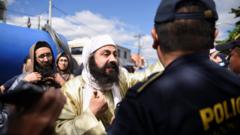Authorities in Guatemala faced a dramatic confrontation with members of the Lev Tahor sect, who attempted to reclaim custody of 160 children recently taken into protective care. The children were rescued during a police raid on a farm associated with the controversial Jewish sect, which has come under investigation internationally for severe sexual offenses.
Interior Minister Francisco Jimenez reported that the children were allegedly victims of abuse by a member of the sect. This situation escalated over the weekend when sect members attempted to forcibly enter a care facility housing the children, leading to scuffles with law enforcement.
The Lev Tahor sect is notorious for its extremist practices, which include advocating for child marriage and imposing stringent regulations on its followers. Women and girls are expected to wear full-body coverings from an extremely young age, and the community is known for harsh punishments for minor infractions. The sect has accused the Guatemalan government of religious persecution, following its migration to Central America and Mexico between 2014 and 2017.
The upheaval began last Friday when authorities raided the sect's farm located in Oratorio, southeast of Guatemala City, based on allegations of "forced pregnancy, mistreatment of minors, and rape." Just two days after the children were placed under protective care, approximately 100 relatives of the children, all affiliated with Lev Tahor, gathered outside the facility demanding their return. In an attempt to recover the kids, sect members broke the gate, but were ultimately stopped by police, who managed to place the minors in a secured minibus.
According to the Attorney General’s Office, the children were swiftly relocated and safeguarded against any further attempts by the sect. The local Jewish community has distanced itself from the Lev Tahor sect, denouncing it as foreign and reiterating support for the Guatemalan authorities in their ongoing investigations aimed at protecting vulnerable individuals.
As this situation develops, the community, estimated to consist of around 50 families across various countries, continues to face scrutiny over its practices and the well-being of its members.



















